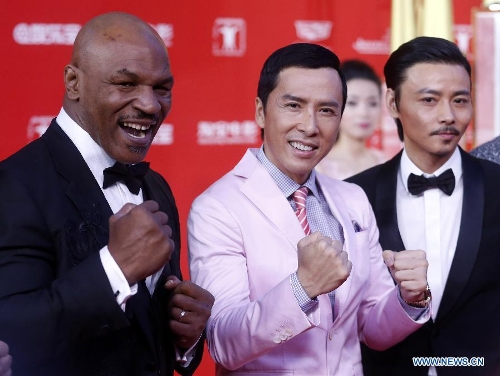ARTS / CULTURE & LEISURE
More youth-oriented film festivals to boost interaction among young people in HK, Chinese mainland: Movie star Donnie Yen

Leading casts of the movie "Ip Man 3" Donnie Yen (C) and Mike Tyson (L) walk the red carpet at the 18th Shanghai International Film Festival in Shanghai, east China, June 13, 2015. The 9-day festival kicked off on Saturday. (Xinhua/Ding Ting)
Chinese filmmakers are now increasingly respected in Hollywood, getting better roles and scripts, which shows the strength of China's market and the dignity of its people, said Hong Kong action movie star Donnie Yen, who is also a member of the Chinese People's Political Consultative Conference (CPPCC) National Committee.
On the sidelines of China's ongoing annual "two sessions," a highly anticipated event on the country's political calendar, Yen shared with media his experiences as a Chinese film industry professional in Hollywood.
He attributed the increasing respect earned by Chinese film professionals in Hollywood to their continuous hard work and efforts over the years, and the strength of China and the Chinese market, as well as the dignity of the Chinese people.
He stressed that only films that can move audiences and resonate with them can have a far and wide reach. This way, the "Chinese core" of films can be seen by more people.
In the past, Chinese kung fu films were more familiar to and well received by audiences overseas. As these types of films are relatively straightforward and overseas audiences coming from different cultural backgrounds can understand them easily without needing to delve deeply. Yet with the types of Chinese films growing increasingly diversified, things are changing.
"Now the audience is smarter and has higher standards for films, which means films have to resonate with the audience," Yen said.
In order to promote exchanges between young people in Hong Kong and the Chinese mainland, Yen said he hopes to organize more youth-oriented film festivals to boost interaction among young people.
"In the past, I brought some young Hong Kong filmmakers to the Chinese mainland to learn, and likewise introduced some Chinese mainland filmmakers to Hong Kong for exchanges, so everyone could learn from each other."
Yen said that he started collaborating with Chinese mainland filmmakers in the 1980s.
"Now we focus more on creation and innovation. We rarely say who's from Hong Kong or who's from the Chinese mainland. We are all Chinese filmmakers."



